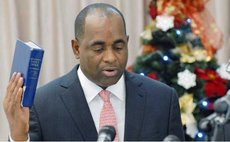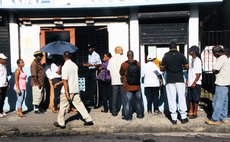Political parties need to select many more female candidates
In an article entitled: Responsibility without authority: the growing burden for women in the Caribbean, Jan Knippers Black has opined that the social and economic hardships which have accompanied globalisation, have been particularly hard on women and have stripped them of resources and authority even as it heaps greater responsibility upon them.
As far as the attainment of positions of responsibility is concerned, women have come a long way but, in our view, the struggle has just begun. This is due to the fact that women exist in a patriarchal society where it is still hard for them to rise to positions of responsibility. There are many men who are still not giving up their position of dominance. These men feel that a woman's place is in the house and not in the House of Representatives.
Professor Verene A. Shepherd of the University of the West Indies has stated: "We (women) are cracking the glass ceiling and in some cases shattering it but there is no Caribbean territory where women are fifty percent of the House of Representatives". She adds that women must not become complacent because although there is a trend toward greater mobilization of the female population in key political processes, their representation in government and in public office is fewer than 20%. Note that women make up one half of the electorate.
In the make-up of political parties there is a high proportion of women; in some instances they are one half of the rank and file. But there are still very few women in party management, even in countries where some political parties have set quotas for women at the management level. The situation is similar in unions and labour confederations. Even in instances where women members are in the majority, the number of women in the very top management positions is minimal.
At the moment, in many areas of the Caribbean women make up the largest percentage of the workforce in a number of sectors, such as the hotel and restaurant industries, education, and health and social work, among others. But, this does not mean they have greater access to managerial positions.
Grenada was the first CARICOM country with a female Governor, Dame Hilda Bynoe. The Caribbean has had female Prime Ministers, in Dominica, Dame Eugenia Charles and in Jamaica, Portia Simpson-Miller. We have also had women serving in senior cabinet positions across the region. You may not agree with their ideologies or political philosophies but the one thing all the female Prime Ministers have had in common was their comfort with participating in the political arena with their male counterparts; their comfort, too, with power and with exercising power. These female leaders were tough, decisive, and full of self-will, self-confidence and passion about politics.
According to Glynis Roberts, a former Grenada's Minister for Labour, Social Development and Gender, politics for women is quite different to politics for men; particularly for women who are wives and mothers because they have to find the right balance to look after themselves, their constituency and their families. Women often have to consider other factors in their lives whereas if a man leaves home at nine in the morning and returns at two the next morning, the most his wife will do is frown. If it is the other way round, it becomes a difficult situation. Nevertheless, the most important factor in advancing the women's access to positions of power and responsibility is to get women to run and get them elected. But statistics indicate that Dominican women continue to stay away from the political platform.
There has been a steep drop in the number of women seeking political office in Dominica over the past 15 years. From 1990, the number of women offering themselves as candidates has fallen by 70 per cent. In 1990, ten years after Dominicans elected Eugenia Charles, the Caribbean's first female Prime Minister, one in every six candidates were women. Of the ten who offered to represent their constituencies then, three won the election. Five years later, although the total number of candidates had increased from 60 to 63, the number of women in the political race slightly decreased to nine. Again, three of them were elected. In the 2000 general election campaign, there were 56 candidates, but only six of them were women - a 33 per cent drop from the previous period. Of the six, two were successful. In the 2005 election only three women were in the race. Only one won. For the 2009 poll there were nine women among 62 candidates- only two won. And in the up-coming 2015 election, five women have entered the political arena so far.
What is keeping women away from politics? A years ago Alix Boyd-Knights, a lawyer and Speaker of the House of Assembly for the last 14 years explained the position of women's participation in Dominica politics this way: "There's no incentive for women to become parliamentarians. The price is so high not many (women) are willing to pay it. It's the type of politics that we are confronted with that causes women to shy away from the political arena. The price of risking being vilified by opponents, not many women are willing to go through that ordeal. The honest truth is it takes a very, very brave woman to consider entering Caribbean politics."
As we opined in a response to a letter to the Editor a few weeks ago, that was critical of the "morals" of a female candidate, men are not subjected to the same standards that women face in the political environment. That must change.
It is common knowledge that over the last few decades, women have emerged as the most progressive, committed and educated members of our society. It therefore seems ludicrous that while political parties struggle to find suitable candidates to contest the upcoming general elections, they are not utilizing this vast resource. It is clear that we need to find innovative ways to support women who have an interest in political life, but have family responsibilities.



